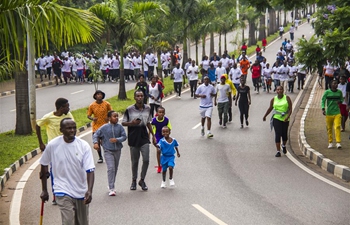by Maria Spiliopoulou, Valentini Anagnostopoulou
ATHENS, Dec. 1 (Xinhua) -- For Raphael Bilidas, life does not end with an HIV diagnosis, but a new journey begins which requires fighting harder for access to full healthcare to improve living, as well as standing up against stigmatization which is linked to misinformation and fear.
Bilidas, 29, was diagnosed with HIV in 2014, but disclosed it to his family and society a few months ago. He has been working for the past two years as fundraiser for Positive Voice, the association of people living with HIV in Greece.
"It was quite intense for me to, you know, try to understand and digest the fact that I will be living with HIV from now on. I was lucky though, because at the time I had already been in contact with people living with HIV," he told Xinhua in a recent interview about his experience living with HIV on the occasion of the World AIDS Day that falls on Sunday.
Facing agony about frailty and a new reality that includes regular medical tests and championing for the right to new medication, HIV positive persons in Greece also have to combat shortage of knowledge about the virus that can lead to AIDS and discrimination, he said.
HIV positive persons are still getting laid off and face racism even by medical professional. Despite the numerous obstacles, Bilidas chose a positive thinking and stance.
"For me HIV can be what you make out of it. It can be a lifelong sentence to depression and all sorts of negative feelings that you might feel locked up, but it can also be an opportunity to decide to stand up for yourself, to be truthful, to put your fears aside and look calmly and directly to what you have to deal with," Bilidas explained.
He tried to grasp the new reality before telling his family. Once he did, he had his mother standing next to him on stage on an awareness campaign, but he no longer has a relationship with his father.
"We all should have the right to live our lives," is his response to rejection.
"We haven't reached the point where society understands that HIV is something manageable," Damianos Antoniou, head of the volunteering department of Positive Voice, explained.
The association was established in 2009 and aims to promote information, prevention and the rights of HIV positive persons.
Fighting stigma in personal and professional relations, while also trying to find a balance within you is not an easy task, he noted.
"It is one thing having knowledge and another one your emotions. I might know 100 percent what HIV is all about and that on a practical level I will not die, I will have to take a pill every day and going through medical tests twice a year, but on an emotional level I am a wreck. One has to achieve a balance," he said.
Antonis Papazoglou, 39, an empowerment officer at Positive Voice until a few months ago, has also starred in awareness campaigns after finding his balance.
The day he was diagnosed, nine years ago, Papazoglou lost his job and the next day he lost his father to lung cancer, so he didn't have time to think about the diagnosis.
He collapsed psychologically several months later, sought help and changed his life style. He quit smoking and left behind bad diet habits.
"HIV is just a part" of him, because he has dealt with it and "the virus is not running" his life, is his key message which is also still posted on the association's website.
"These people are not different compared to the rest of the population, why should there be a stigma? They can live as members of society; they can work, have dreams, fall in love and do whatever the rest of people are doing," Marios Lazanas, Internist - Infectious Diseases Specialist and president of the Hellenic Association for the Study and Control of AIDS, told Xinhua.
The statistics are looking better, but HIV positive persons are still facing issues. In the first ten months of this year, 473 new diagnoses of HIV were recorded, according to the National Public Health Organization. The drop is significant compared to the more than 1,000 cases identified in 2011, when a major outbreak was recorded among intravenous drug users.
"In 2019 for the first time it seems that there is a decline compared to previous years. At the moment there is a total of 18,000 persons who have been recorded (during all these years) infected with HIV. Obviously there is more who haven't been recorded and there is an ongoing effort to find them so that they can start treatment," Lazanas said.
Measures implemented to tackle the outbreak among drug users, identify new cases as soon as possible and initiate treatment have helped, but more needs to be done, he explained.
Experts call for further support of HIV positive persons by the Greek state and the introduction of practices which have proved efficient abroad, such as Pre-exposure prophylaxis (PrEP).
By providing preventive medication to people who do not have HIV, but are at high risk of contracting the virus to prevent HIV infection and aiding HIV positive persons more, the epidemic can be dealt with more efficiently, they argue.
Due to financial and bureaucratic reasons, over the past five years HIV positive persons in Greece who are on an antiretroviral therapy cannot have their viral load tested every 6 months as suggested by doctors to check the efficiency of the drugs and ensure that the virus will be transmitted, Lazanas noted.













